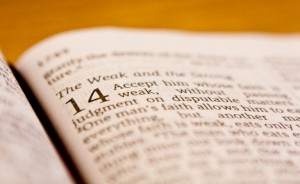Saturday, January 16th, 2010 at 11:22 am
Today marks the 14th day of our Daniel Fast.
During this time of prayer and meditation on God’s Word, I’ve found that my inadequacies at engaging in a fuller prayer life are surfaced. While others about me seem to readily spout eloquently laced verbal prayers, whether in a worship service or an informal gathering, I’d rather take time to think about what I have to say, and then say it – as succinctly as possible. While some leaders extol (even direct) congregants to speak their prayers and worship “out loud”, ostensibly so others around them can hear them, I prefer to quietly direct my supplications to God. While some fellow Christians claim to have conversations with God, I tend to read the prayers in the Bible not as informal conversation, but as meditative communion. As such, it can be very frustrating for someone like myself to model his prayers as many of those in the church.
As I’ve been reading Adam McHugh’s book, Introverts in the Church, I’ve been enlightened to many aspects of introversion that I was previously unaware of. One aspect that struck me, regarding this prayer issue, is that of how the typical introvert’s mind works. In a nutshell, while an introvert is typically quiet on the outside, inside his mind is racing from thought to thought, idea to idea, recalling and analyzing past events, and so on. This is exactly the type of process that I find happening with myself (and, silly me, all this time I thought I was just daydreaming!). What McHugh states, though, is that the introvert must learn to harness this thought pattern and not just let it run unhindered. As this applies to prayer, I think one must learn to take control of the various thoughts permeating through his head, and take cues from them as prayer petitions – guides, if you will, to your supplications.
Yesterday, I read, out loud, from our church Bible, in our church sanctuary. As part of our group fast, our pastor has instituted that our congregation read the Bible within our sanctuary. It is a wonderful opportunity to have God’s Word read out loud, completely through, within the walls of the church. Individuals and families sign-up for various 1/2 hour time slots, throughout the week, and simply arrive, read, and enjoy the presence of God. In the past, we’ve had members of our deaf church participate by signing the Word, and we’ve had an Old Testament scholar read in Hebrew. My reading, yesterday, stretched from Romans 14 to I Corinthians 6.

Romans 14, from the Bible in our church sanctuary.
Image – © A. R. Lopez





